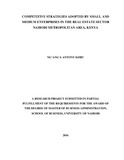| dc.description.abstract | The need for Small and Medium Enterprises to align their operational performance systems with their strategic goals has been a major concern for scholars. SMEs are greatly influenced by the environment in which they operate. Theoretical foundations that explain interaction of organizations and the environment have been analyzed in this proposal. The theories are Environment dependence theory, open systems theory; chaos and complexity theory. SMEs in the real estate sector are vital in poverty alleviation and job creation in the developing economies. Residential units in Kenya generate an average rental yield of 5%, while commercial space generates an average yield of over 9%. The report indicates that the total return, including rental yield and appreciation, is about 28%. The study objective was to critically examine SME’s competitive strategies in the real estate sector in the Nairobi Metropolitan Area. More importantly identify the relationship between the competitive strategies adopted and the resultant competitive advantage to the firms. The research will help create awareness to policy makers in Government to understand the various challenges SMEs encounter in the starting up and in daily business operations. SMEs should thus be a consideration by government as they analyze, formulate and implement policies. A descriptive research design was adopted with cross-sectional survey. Descriptive study enabled the researcher to collect information from a cross-section of the study population and the results from the survey method extrapolated to the entire population. Besides, this method is time saving, and less costly. The study targeted a population for 74 SMEs in the real estate sector in Nairobi Metropolitan Area. Questionnaires were used to collect mainly quantitative and qualitative data. The study established the factors that challenge operations at the organization were; competition due to entry of other firms, consumer disposable incomes, technological changes, legal and regulatory changes. The study established that strategies adopted by Small and Medium Enterprise in the real estate sector to gain competitive advantage were the adoption of new technology, strategic alliance, innovation strategies, diversification and strategic human resource management. The study recommends that there is need for the management of small and medium enterprise to form strategic alliances with other firms in complimenting sectors of the economy. This will assist in their diversification strategies hence help them in gaining competitive advantage. There is need for the management of Small and medium enterprise to invest in research and development, this will help them to be innovative hence assist them in gaining competitive advantage too. The study recommends that Small and medium enterprise should employ competent and skillful personnel who will assist them in gaining competitive advantage through strategic human resource management. There is need for the Small and medium enterprise in the real estate sector to form joint ventures when executing large project and adopt new technologies towards cost management hence improve their financial performance. | en_US |



